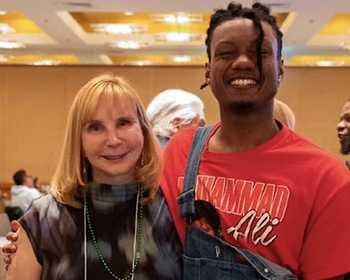Lawyer Advocates for School, not Prison
-
-
Slice of MIT
Filed Under
Recommended

Michele (Gershman) Scavongelli ’79 was 54 years old when she became a lawyer, but she was already an experienced advocate.
“I was always advocating for ideas, a new product launch, a marketing campaign, and for my employees,” says Scavongelli, who went back to school after a successful career in the insurance industry.
Today Scavongelli is executive director of the Youth Advocacy Foundation (YAF), the nonprofit arm of Massachusetts’ juvenile public defender agency. “Our mission is to shut down the school-to-prison pipeline,” Scavongelli says. “Kids who don’t succeed in school, are suspended or drop out, are three times more likely than other kids to end up in adult jail.”
If we could keep people in school and out of jail, that would be better for the economy and for society.
Scavongelli grew up in Baltimore and was the first member of her family to go to college. “We didn’t have money, but I was lucky and had the support of my mother and father, who prioritized education,” she says.
A math major at MIT, she started her career as an actuary for John Hancock Mutual Life Insurance and rose through the ranks, retiring in 2005 as executive vice president of the company’s long-term-care division. She later served as senior vice president and general manager in the retail insurance and annuities division at Sun Life Financial.

Along the way, she had five children (one even attended MIT: Carolyn Buchwald ’07, PhD ’13) and helped raise two stepchildren. She also did a lot of volunteering—including in the Boston Public Schools—which made her realize how lucky she and her children were. “My eyes were opened to what a lot of children didn’t have,” she says.
Then a management change at Sun Life left Scavongelli looking for a new challenge. She decided to dive into advocacy and began volunteering as a court-appointed special advocate (CASA)—a representative who works on behalf of children in foster care. She quickly saw that lawyers often got results when others in a child’s life went unheard. “Race is a big part of it, but it’s also socioeconomic status,” she says. “A person in a suit walks in, and suddenly people in power pay attention.”
Scavongelli decided to go to law school at Northeastern University, and through its co-op program gained additional experience working for the Massachusetts Office of the Child Advocate and at the firm Kotin, Crabtree & Strong, which focuses on special education.
“I thought I might like to be a juvenile public defender,” Scavongelli says—but she was told she couldn’t get that job straight out of law school. So, she went to work at the EdLaw Project, a YAF-supported initiative that focuses on education advocacy—which includes everything from fighting for kids to receive special needs services to demanding education for children in state custody.
Scavongelli loved the work and over time took on additional responsibilities. Named executive director at YAF in January 2022, she now handles fundraising and marketing in addition to direct legal advocacy work. She has represented more than 200 students since earning her JD in May 2012.
“I enjoy making a difference,” says Scavongelli, noting that that many children—particularly in the foster care system—have no one to speak for them when they face disciplinary action at school. If they are labeled disruptive and are suspended, they can swiftly lose access to the education that could help them build a better life.
One foster care client she helped, for example, was in 11th grade even though he read at only about a third-grade level. Scavongelli worked to ensure he got testing for dyslexia and tutoring to finish high school. He has since finished a two-year college program and is hoping to transfer to a four-year college. “Only about half of all foster kids even graduate high school, and only 4 percent finish college,” Scavongelli notes.
Another client faced expulsion following an incident at school. The boy had been in foster care since age six, attended a special needs school, and had an Individualized Education Program (commonly called an IEP), but he had nearly completed his high school graduation requirements. “This young man had done the work. He was close!” Scavongelli says. She worked to get him transportation and tutoring so that he could complete his final high school class.
“We spend so much on keeping people in jail—10 times as much as keeping people in school,” Scavongelli says. “If we could keep people in school and out of jail, that would be better for the economy and for society.”
Photo illustration (top): Adobe Stock / MITAA staff; inset photo: courtesy of Michele Scavongelli







